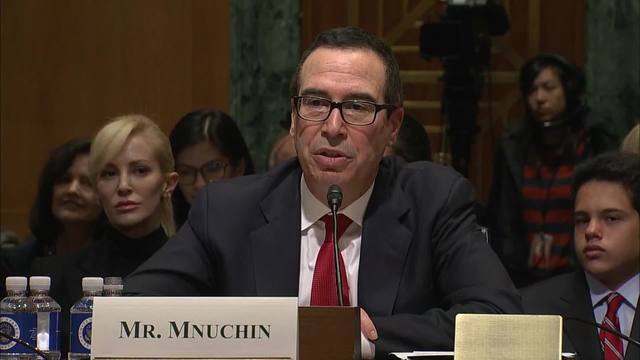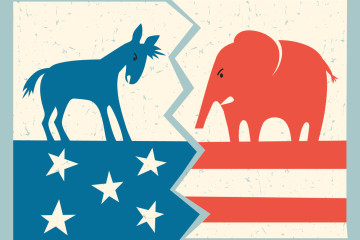Mnuchin Says Excessively Strong Dollar May Hurt U.S. Economy

published Jan 23rd 2017, 4:51 pm, by Saleha Mohsin
(Bloomberg) —
U.S. Treasury Secretary nominee Steven Mnuchin said an “excessively strong dollar” could have a negative short-term effect on the economy.
“The strength of the dollar has historically been tied to the strength of the U.S. economy and the faith that investors have in doing business in America,” Mnuchin said in written responses, obtained by Bloomberg News on Monday, to questions from U.S. senators following his confirmation hearing last week. “From time to time, an excessively strong dollar may have negative short-term implications on the economy.”
The dollar fell to the lowest level of the day after his remarks were published.
President Donald Trump expressed concern about the dollar’s appreciation in an interview with the Wall Street Journal this month, saying the currency was “too strong.” That prompted speculation that his administration might reverse longstanding tradition in the U.S. to support a strong-dollar policy. Mnuchin told senators last week during his confirmation hearing that a strong dollar is important over the long term, while noting that it’s currently “very, very strong.”
Read here for background about Trump and the U.S. strong-dollar policy
“A stronger dollar increases U.S. dollar purchasing power,” Mnuchin wrote. “To the extent the dollar gains strength relative to other currencies, assets priced in those other currencies would become cheaper on a dollar basis.”
Senate Vote
Mnuchin, a former Goldman Sachs banker, is awaiting confirmation by the Senate, which has yet to schedule a vote. While Senate Democrats grilled him on Thursday in an often contentious hearing, which lasted almost six hours, Mnuchin is widely seen securing the nomination with the backing of a Republican majority.
Mnuchin also reiterated his intention to review “the issue of Chinese currency manipulation,” which he sees as a “serious infraction of free trade principles and needs to be effectively addressed,” according to his written response to the Senate Finance Committee.
“I will ensure that we defend American jobs by combating currency devaluation through legislative processes established by Congress,” he said.
Trump had already softened his stance on China’s currency policy, telling the Wall Street Journal that he wouldn’t name the country a manipulator on his first day in office, as previously promised. “I would talk to them first,” Trump was cited as saying by the Journal. “Certainly they are manipulators. But I’m not looking to do that.”
Most economists say China has done a reversal of its policies to weaken the yuan, which were designed to stimulate exports. Instead, China has been propping up the currency amid a flood of capital outflows.
China Dialogue
Mnuchin said he will use the U.S.-China Strategic and Economic Dialogue as a forum to address how he can help American workers. “As Treasury secretary, I will work with the president to examine the U.S. trade relationship with China and assess the damage to the American economy from China’s practice of intervening in currency markets to manipulate the yuan-dollar exchange rate, as well as other unfair tactics that violate free trade principles,” he said.
Mnuchin will find some allies among Democrats in going tough on China. Senator Robert Casey of Pennsylvania is among those in his party who support having a government panel review the purchase of so-called soft-power institutions, such as Hollywood studios, by Chinese firms.
In response to a question related to that from Casey, Mnuchin said that such acquisitions “may need to be reviewed” by the Committee on Foreign Investment in the U.S.





No Comment